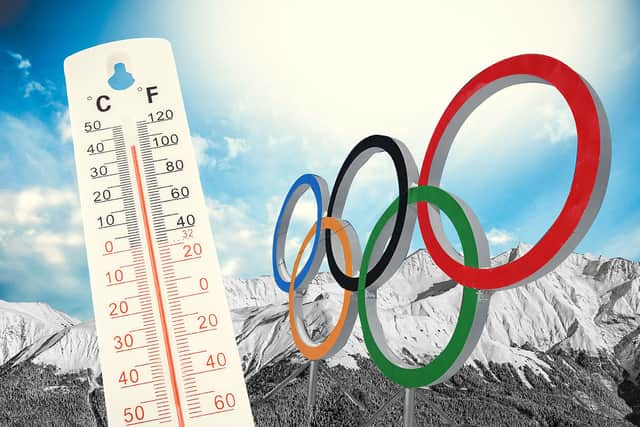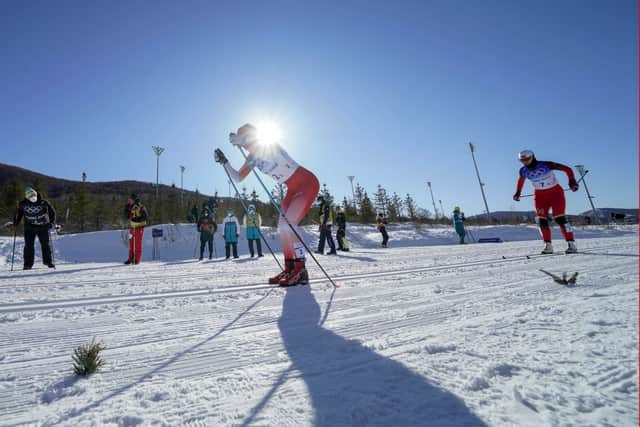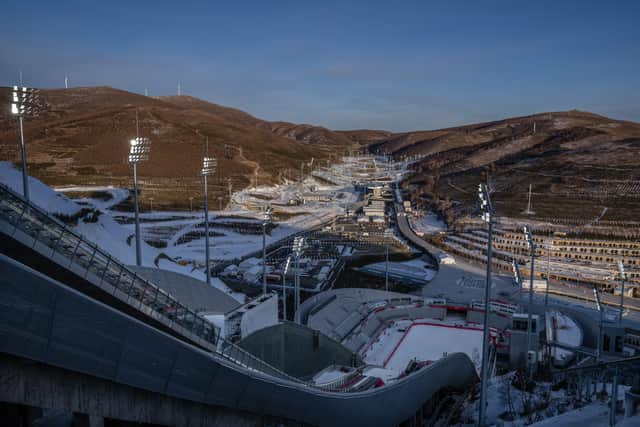Winter Olympics 2022: how climate change is threatening the future of the Games - and previous host cities
This article contains affiliate links. We may earn a small commission on items purchased through this article, but that does not affect our editorial judgement.
and live on Freeview channel 276
The Winter Olympics will struggle to find host cities with enough snow and ice in the future due to the escalating global warming crisis, a study has found.
Only one of 21 previous locations would be reliable enough to host the Games by the end of the century if a high greenhouse gas emission trajectory continues, according to the report.
Advertisement
Hide AdAdvertisement
Hide AdRising temperatures continue to threaten the sporting event, with current trajectories seeing a temperature increase of 4.4°C by 2080.
Another recent study in 2021 found current high emission trajectories could see the average length of winter shorten to as low as 27 days by the end of the century.
Environmentalists warn there will be no winter sports to celebrate in the future if no action is taken to reduce climate change and emissions.


How many previous host countries could hold the Games in the future?
A study by Scott et al at the University of Waterloo in December 2021 used a survey completed by 339 elite-level athletes and coaches from 20 countries to devise four climatic indicators.
Advertisement
Hide AdAdvertisement
Hide AdThese climatic indicators predict fair and safe conditions for snow sport competitions: unacceptably high or low temperatures, rain, wet snow, and poor snow coverage.
They found the frequency of unfair and unsafe conditions had increased over the past 50 years in locations where the Winter Olympic Games were previously held, and that this trend was likely to continue.
- Narrow snow is measured by days with less than 10cm of natural snow.
- Rain is measured by days with greater than 1mm of rain.
- Wet snow is measured by days with maximum temperatures warmer than +5°C, based on consultations with ski area managers and snow technician teams in North America and Europe over the last two decades.
- Unacceptable temperatures are days with daytime max temperatures warmer than +10°C (when competitions typically occur) and unacceptably cold temperatures of -20°C.
Hosts are considered reliable if all four indicators occur in less than 25% of days in February.
They are rated marginally reliable if one or more of the unsafe indicators occur 25-44% of the time, while hosts where one or more indicators occur more than 50% of the time are rated unreliable.
Advertisement
Hide AdAdvertisement
Hide AdThe figure presents the reliability of each Winter Games location based on the combined probability of exceeding the four indicators in each of the timeframes.
Loading....
The study found that from 1981 to 2010 four previous hosts were already considered unreliable: Squaw Valley, Chamonix, Garmisch-Partenkirchen, and Sochi. These host countries continue to be unreliable all the way until late 2080.
By mid-century, if we continue on a high emission trajectory, host countries that will be reliable to host the games are Lake Placid, Lillehammer, Oslo and Sapporo.
Sapporo is the only location that is reliable to host the Games until 2080.
Advertisement
Hide AdAdvertisement
Hide AdBeijing, currently hosting the 2022 Winter Olympic Games, is deemed only marginally reliable to host the Games now up until 2080.
However, the study found if emissions are reduced in line with the Paris Agreement - to limit global warming to well below 2°C levels - nine cities would still be reliable in the 2080s: Salt Lake City, Lake Placid, Calgary, Lillehammer, Nagano and Sapporo.
Are increasing temperatures threatening the Winter Olympics?
A recent study conducted by Wang et al in 2021, published in Geophysical Research Letters, found that the onset of winter has shifted.
The average length of winter was three days shorter in the 2000s than in the 1950s (73 days instead of 76).
Advertisement
Hide AdAdvertisement
Hide AdThe study also found that climate change will continue to shorten winter to between 56 days if current pledged emission reductions are achieved, and 53 days if a current high emission trajectory is maintained in the 2050s.
It could shorten winter to as alarmingly low as 27 days in a high emission trajectory by the end of the century.


As for temperatures, Scott’s study reveals that the February daytime temperature of Winter Games host cities has gradually increased during winter - from 0.4°C in 1920s-50s, to 3.1°C during 1960s-90s and 6.3°C in the 21st century (including the Beijing Games).
Under a low emission pathway consistent with Paris Climate Agreement targets, February temperatures of host cities are projected to further increase by an average of 1.9°C by 2050s and 2.9°C by 2080s.
Advertisement
Hide AdAdvertisement
Hide AdUnder high emission scenarios that maintain current trajectories, it will increase 2.1°C by 2050s, and 4.4°C by 2080s.
Some 94% of the athletes and coaches surveyed shared the fear that climate change will adversely impact the future development of their sport.
In their survey comments, they emphasised that international sporting organisations like the International Olympic Committee (IOC) are the most responsible and influential in the sport community for leadership on climate change.
How have bad conditions already impacted the Games?
The impact of poor conditions was illustrated by The Alpine Ski World Cup in January of this year.
Advertisement
Hide AdAdvertisement
Hide AdThe men’s slalom event was forced to be cancelled by organisers due to a lack of snow and high temperatures.
It was cancelled after only 19 racers, but not before the French Olympic bronze medalist Victor Muffat-Jeandet crashed and injured his ankle.
Bad conditions at the women’s slalom event were also thought to have provided a significant advantage to those starting first, as conditions deteriorated with each competitor.
Petra Vlhová, who started first, won the event, and only 22 of 60 competitors finished the race.
What can be done to limit climate change?
Advertisement
Hide AdAdvertisement
Hide AdSören Ronge, European coordinator at Protect Our Winters (POW) Europe, stresses the importance of reducing climate change and mitigating emissions to save our winters and the seasonal sporting event.
He said: “The science is more than clear, governments must prioritise reducing emissions through cleaner energy and transportation solutions, or there will be no more winter sports to celebrate at Olympic Winter Games, no more family trips to the mountains and the myriad impacts downstream as a result of the loss of reliable snowpack.
“Without consistent snowfall and snowpack, not being able to ski will be very the least of our problems.”


Mr Ronge added: “POW Europe wants to see institutions, such as the IOC and all those who love and depend on the outdoors, come together, to play a vital role in pushing governments to enact systemic changes to the way that we source, distribute, and consume energy.
Advertisement
Hide AdAdvertisement
Hide Ad“The science is more than clear, we need to reduce emissions immediately if we want to save winter, winter sports and see future Olympic Winter Games.
“The situation is very serious. If no action is taken to reduce climate change and mitigate emissions, many regions will have to say goodbye to winter sports in the long run.”
Three-time Great Britain Winter Olympian and POW UK Ambassador, Lesley McKenna said: “I have seen huge changes in the snowpack in ski resorts over the winters and especially in glacier cover/condition in those 30 years and the changes are hugely concerning on many levels.
“I harbour mounting fears for where we could be in another 30 years’ time."
A message from the editor:
Advertisement
Hide AdAdvertisement
Hide AdThank you for reading. NationalWorld is a new national news brand, produced by a team of journalists, editors, video producers and designers who live and work across the UK. Find out more about who’s who in the team, and our editorial values. We want to start a community among our readers, so please follow us on Facebook, Twitter and Instagram, and keep the conversation going. You can also sign up to our newsletters and get a curated selection of our best reads to your inbox every day.
Comment Guidelines
National World encourages reader discussion on our stories. User feedback, insights and back-and-forth exchanges add a rich layer of context to reporting. Please review our Community Guidelines before commenting.
